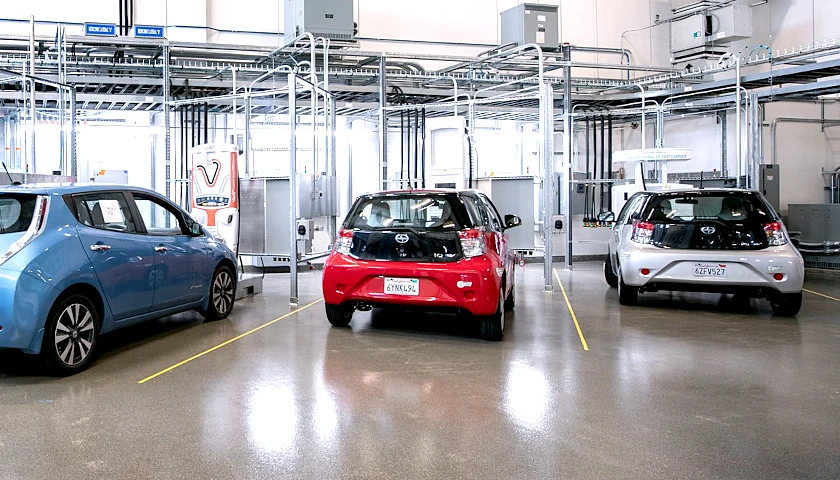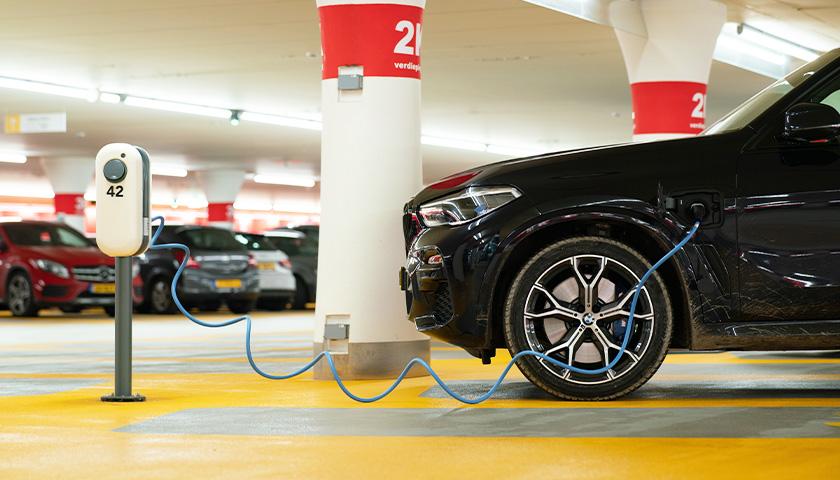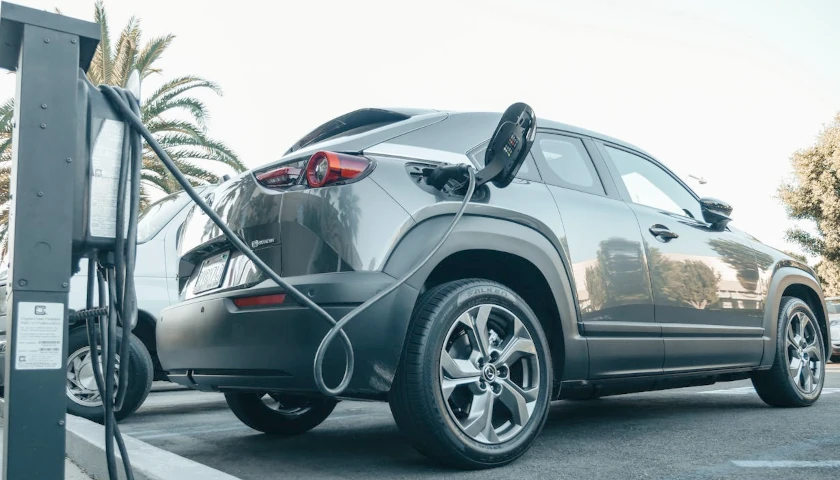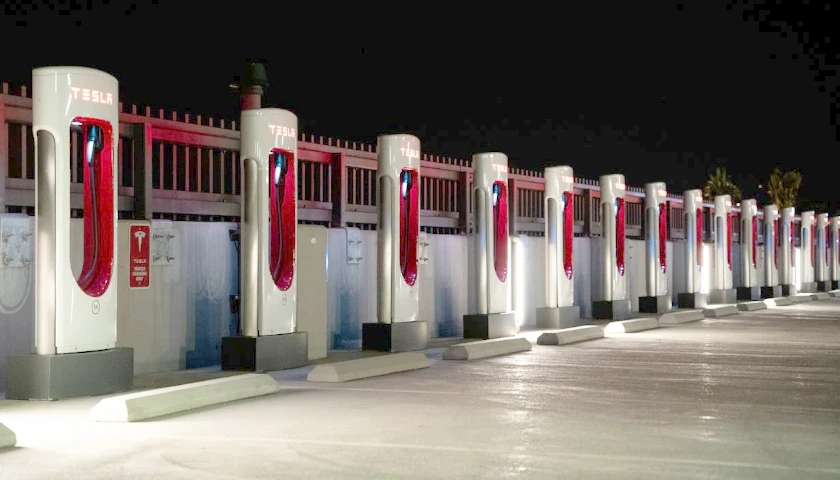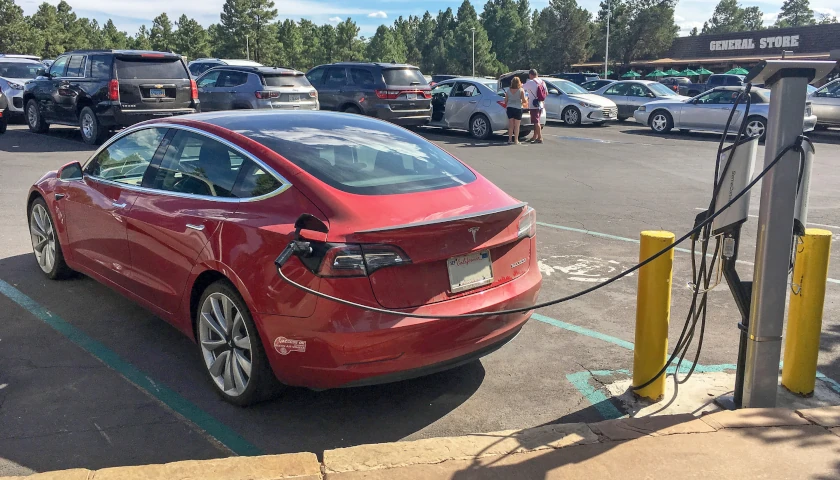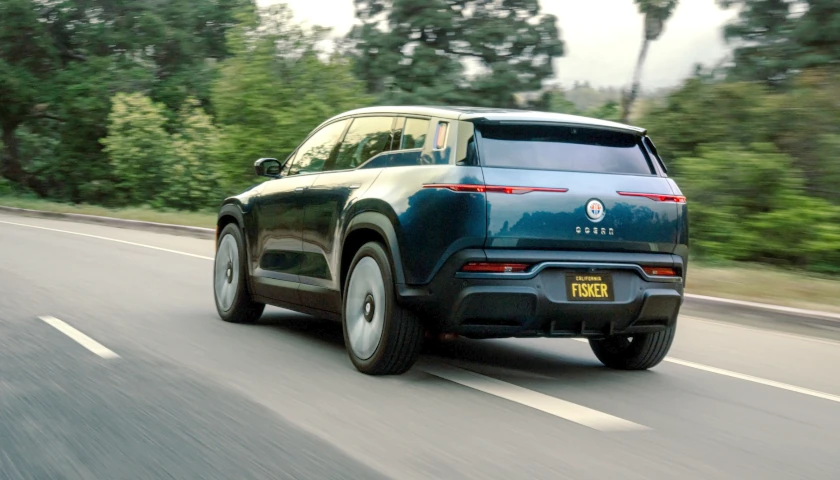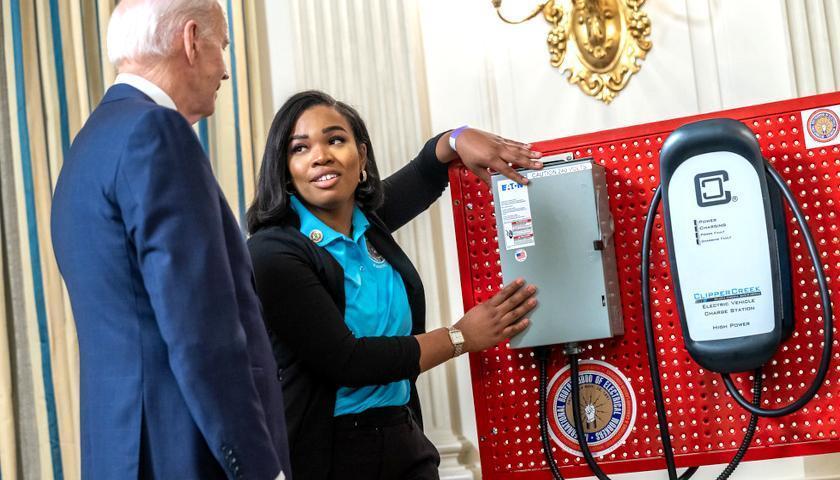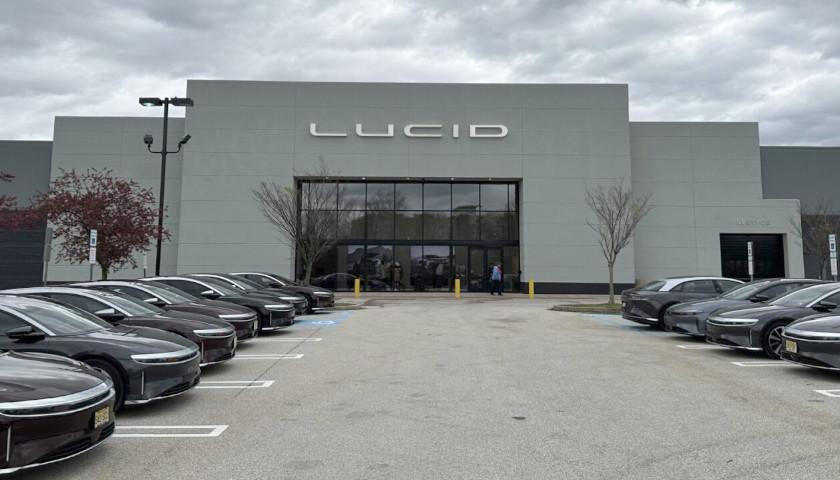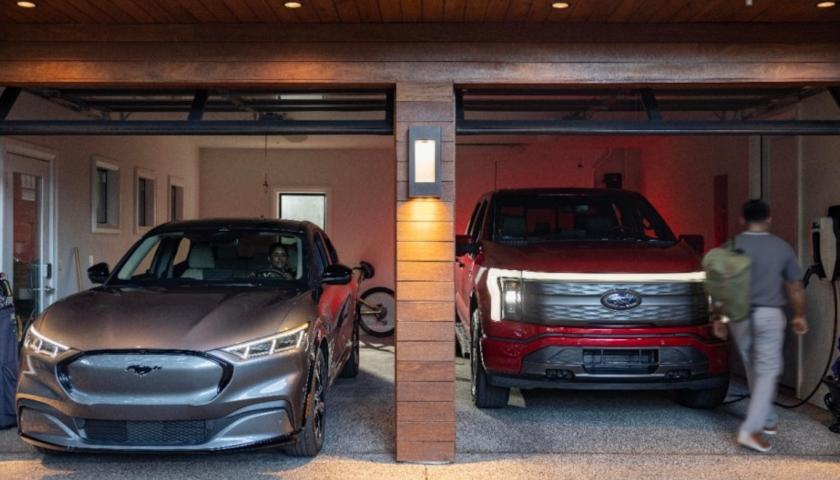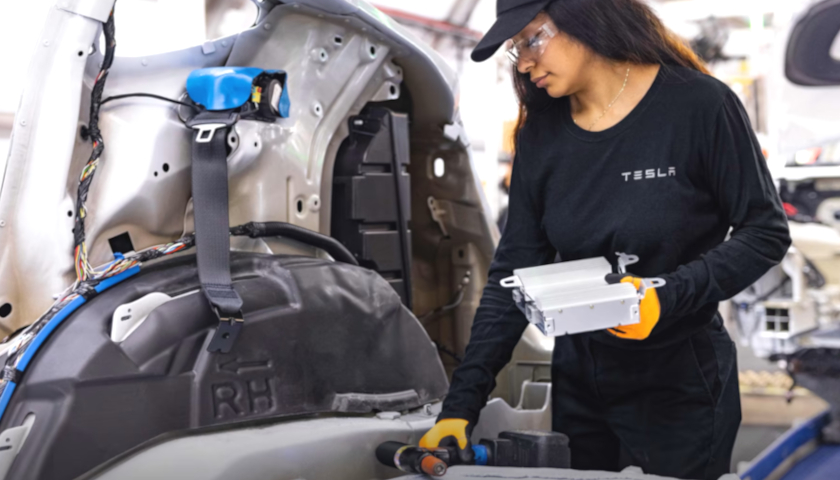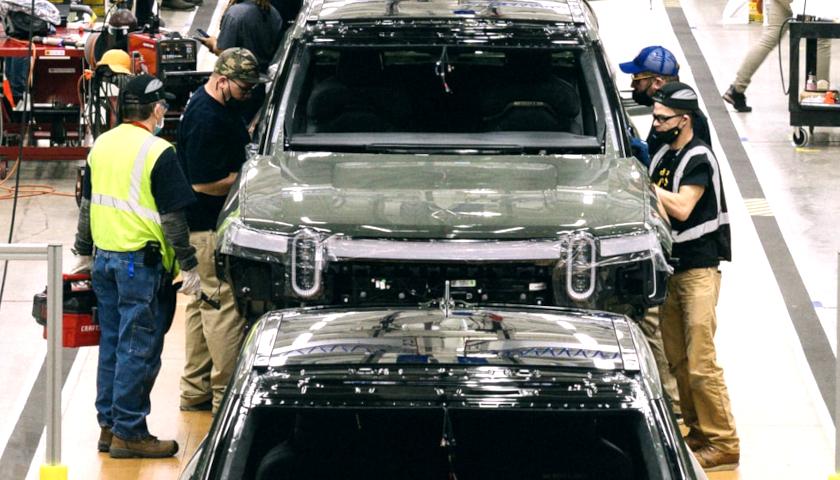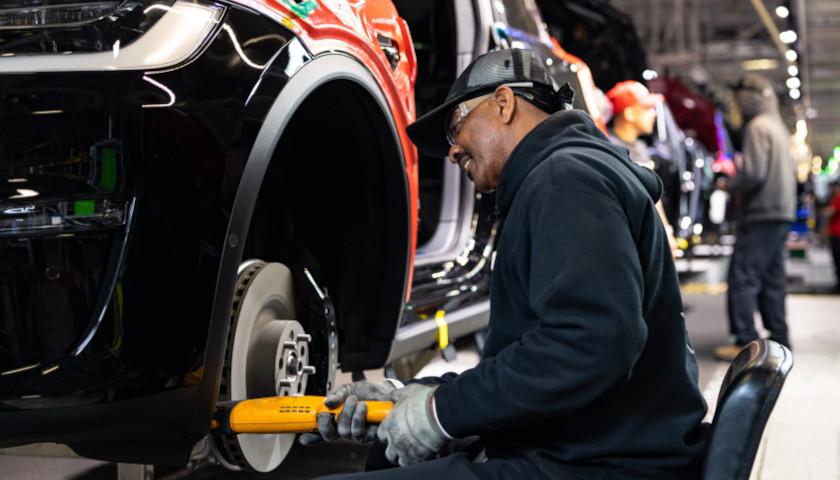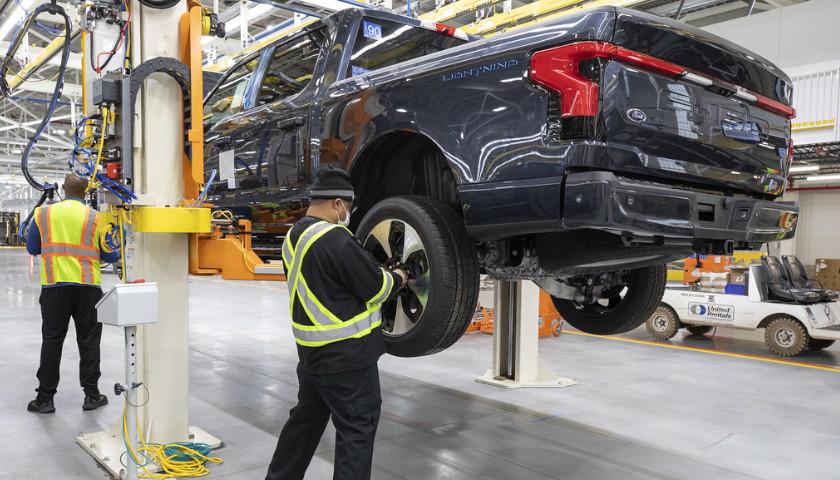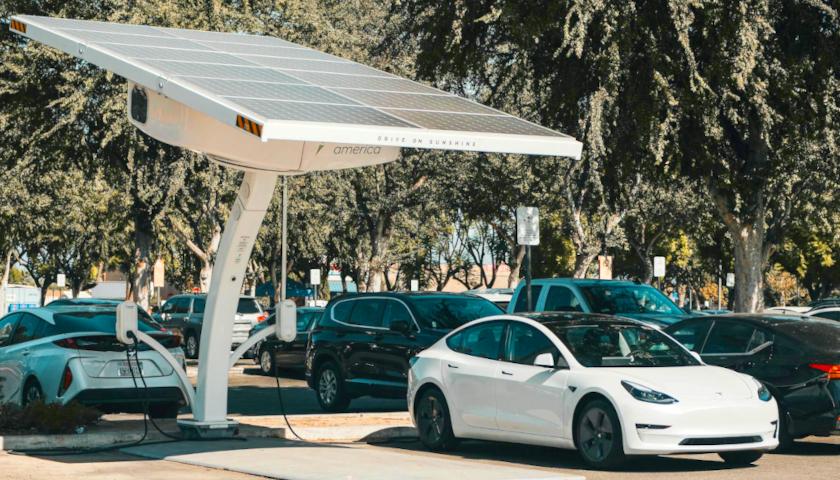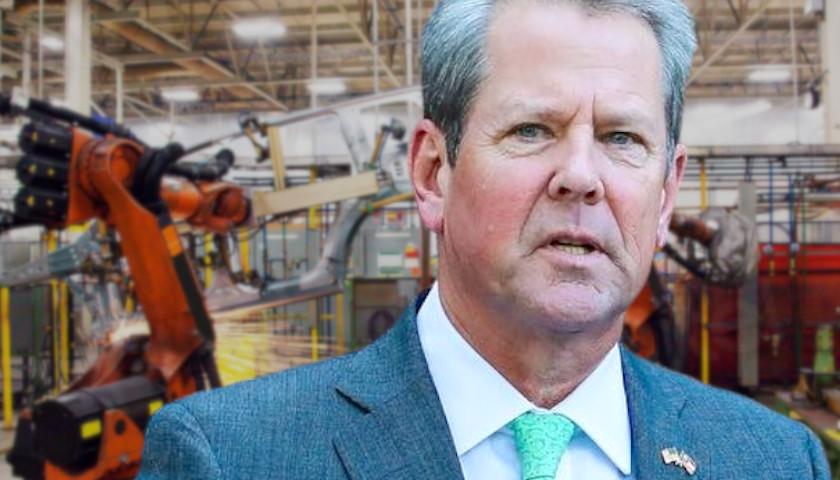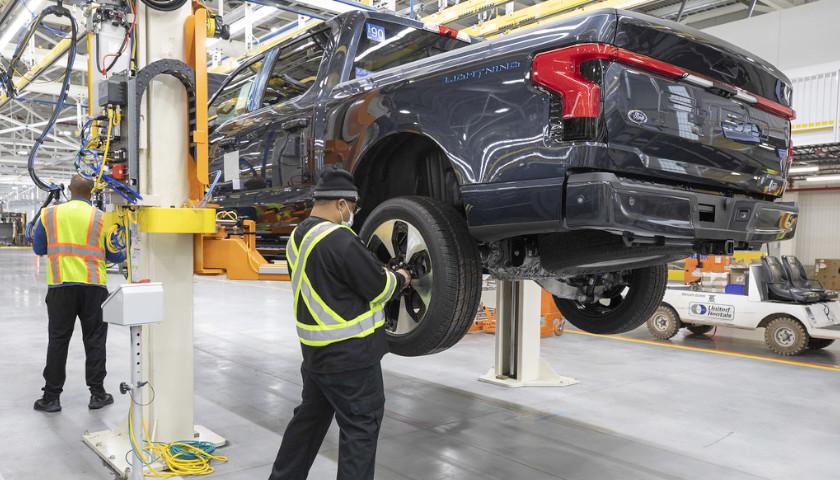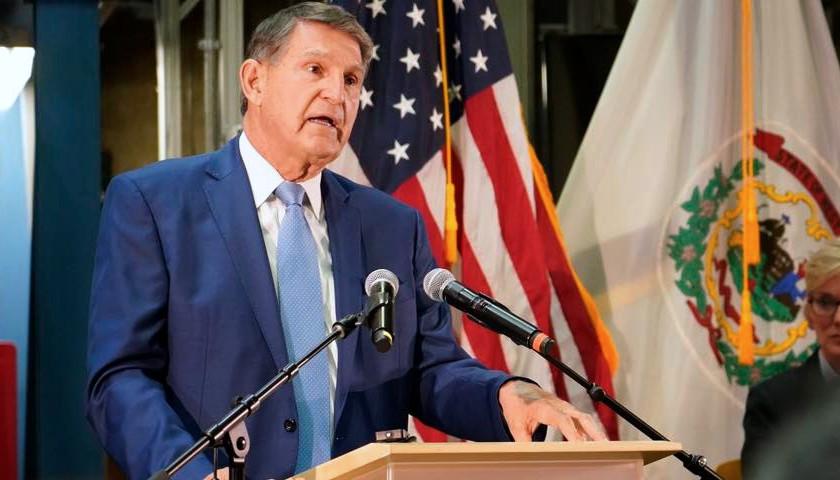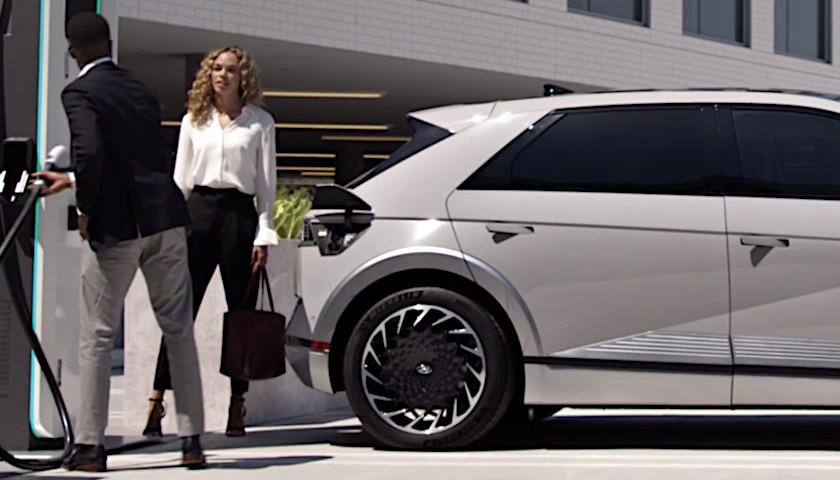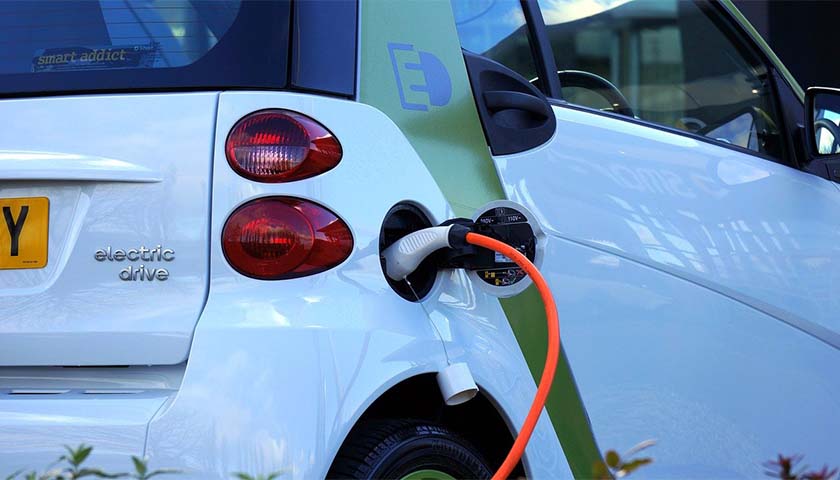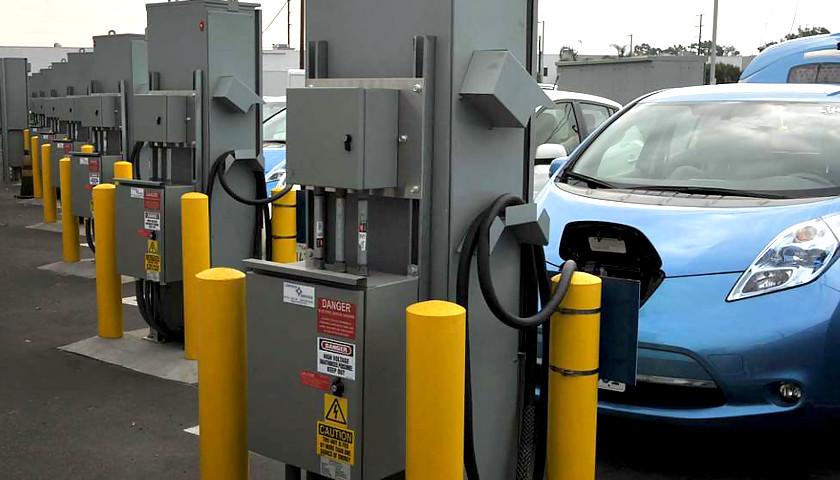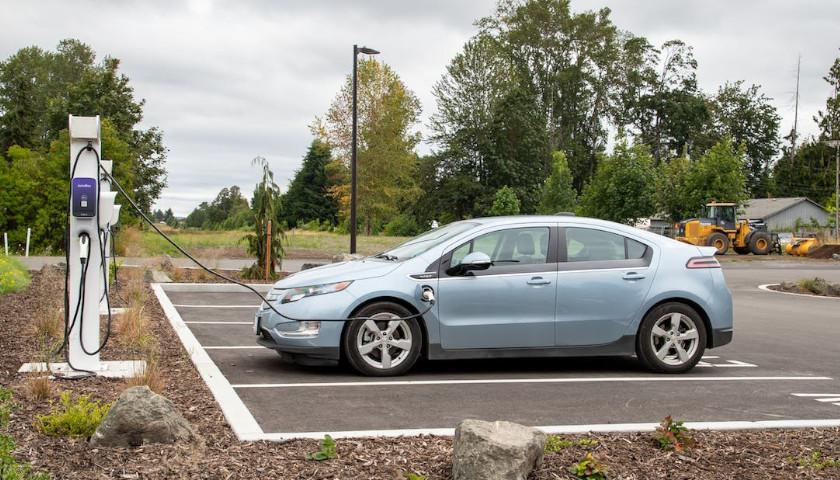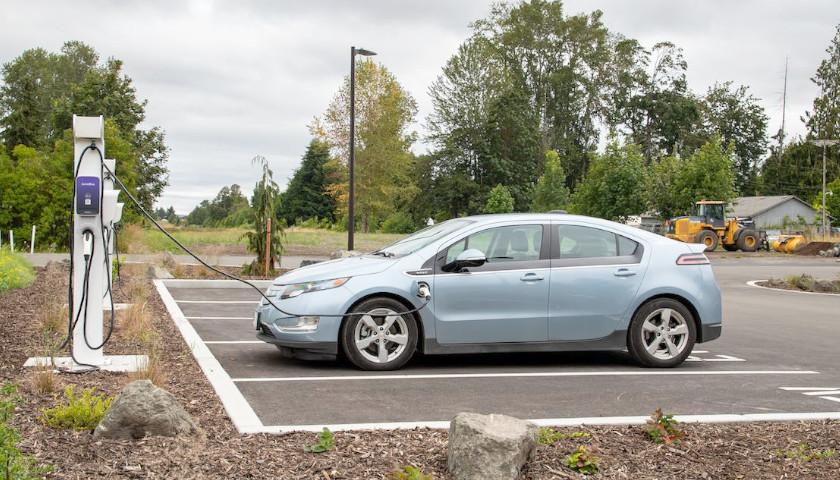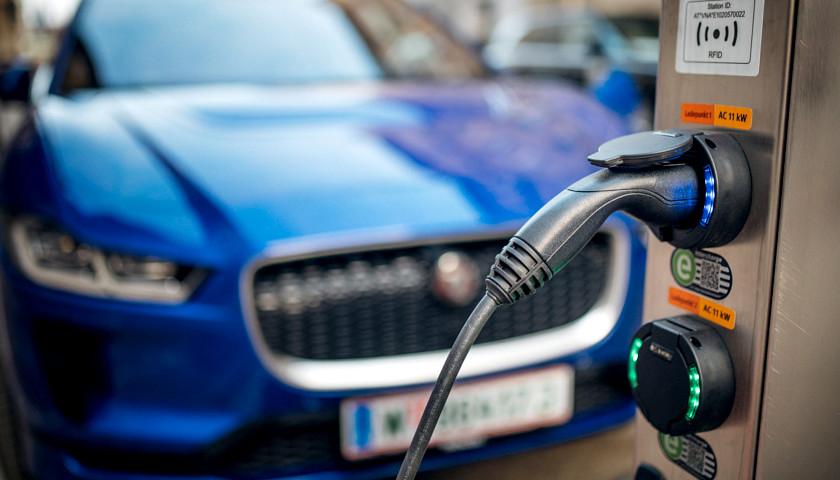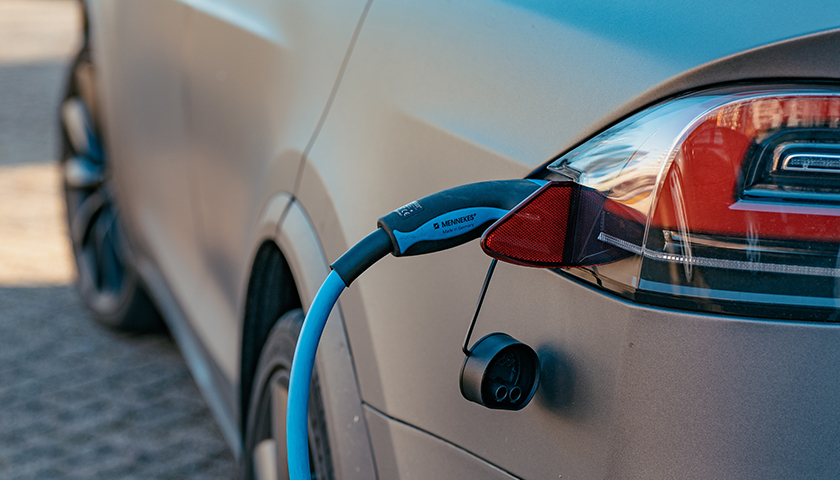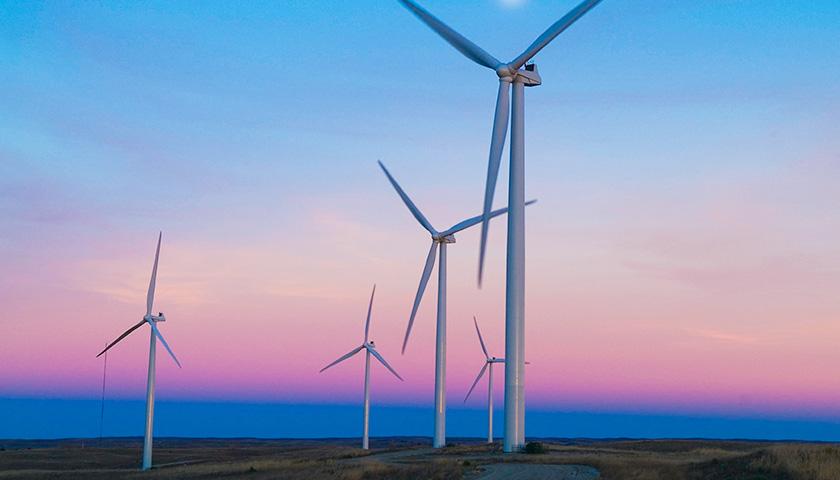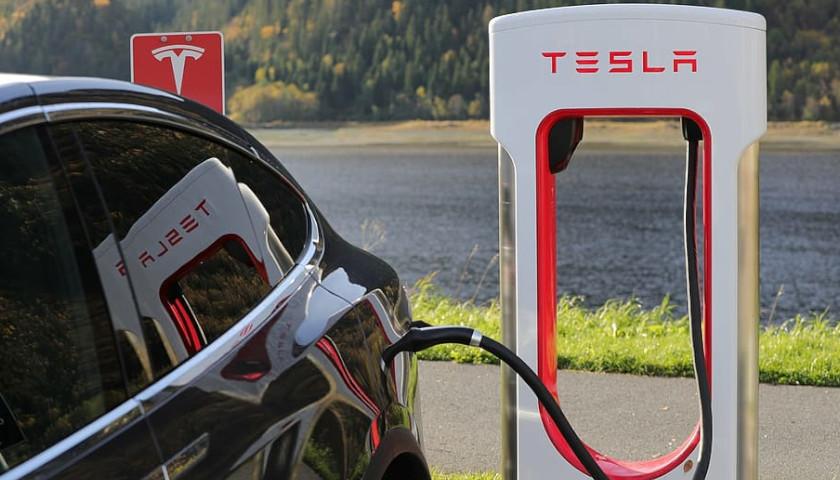Another electric vehicle startup is struggling in the face of a difficult EV market.
Read the full storyTag: electric vehicle
Experts Warn Hackers Can Take Control of EV Features, Even Trigger Battery Fires
In September, thousands pagers and walkie-talkies held by members of Hezbollah exploded. The incident appears to have been the result of explosives hidden within the batteries of the devices by Israel’s intelligence service, Mossad, and the Israeli military, then triggered remotely.
Read the full storyAutomakers Hit Reverse on Idealistic Electric Vehicle Targets Despite Billions in Biden-Harris Subsidies
Automakers have continued to backpedal on electric vehicle (EV) targets over the last year as a slackening of consumer demand has hampered growth despite the billions in subsidies lavished on the industry by the Biden-Harris administration.
A wide array of auto manufacturers have abandoned key EV goals since February, with Volvo, Ford and Mercedes-Benz all dialing back electric quotas or dropping previously planned product lines. The shifts in corporate strategy suggest the EV transition — once touted by auto executives like Ford CEO Jim Farley as the industry’s future — may not be as feasible as once thought due to consumer aversion to lower mileage ranges, a lack of charging infrastructure and higher prices, experts told the Daily Caller News Foundation.
Read the full storyDespite High Costs and Questionable Benefits, Proponents of EV Mandates Continue to Defend Policy
Though the Biden administration’s emissions standards – often referred to as an electric vehicle mandate – don’t kick into 2032, the policy is already running into problems with charging station availability, declining consumer interest and automakers losing billions of dollars on their EV sales.
Read the full storyCommentary: The Nationwide 500,000 Electric Vehicle Charger Charade
The word charade has several meanings, and including an act or event that is clearly false (Cambridge Dictionary), something done just for show (Vocabulary.com), or a situation in which people pretend that something is true when it clearly is not (Oxford Leaner’s Dictionary).
The charade I refers to is President Biden’s $7.5 billion dollar investment to install 500,000 electric charging stations along America’s highways by 2030. A reliable and convenient public EV charging infrastructure is critical to achieve the President’s goal of meeting the recent EPA CO2 emission regulation that require nearly 72 percent of U.S. new light vehicle sales to be fully electric or plug-in hybrid by 2032. Without diving deeper into the announcement, one would likely assume that $7.5 billion is sufficient to construct the 500,000 charging stations, one every 50 miles along the nation’s highways.
Read the full storyHuge Percentage of EV Owners Want to Go Back to Normal Cars, Study Finds
Nearly half of American electric vehicle (EV) owners want to buy an internal combustion engine model the next time they buy a car, according to a new study from McKinsey and Company, a leading consulting firm.
Approximately 46 percent of Americans who own an EV want to go back to a standard vehicle for their next purchase, citing issues like inadequate charging infrastructure and affordability, according to McKinsey’s study, which was obtained and reviewed by the Daily Caller News Foundation. The study’s findings further suggest that the Biden administration’s EV push is struggling to land with American consumers, after 46 percent of respondents indicated that they are unlikely or very unlikely to purchase an EV in a June poll conducted by The Associated Press and the University of Chicago’s Energy Policy Institute.
Read the full storyEV Start-Up Files for Bankruptcy One Year After Rolling Out Its First Model
An electric vehicle (EV) producer that was once a splashy start-up company has filed for bankruptcy.
Fisker filed for Chapter 11 bankruptcy on Tuesday after trying and failing to secure more investment to stay afloat, the company announced. The company once attracted robust interest and hype, marketing itself as the Apple of vehicles, but it struggled to run as a public company and was stuck with thousands of EVs that it did not sell, according to The Wall Street Journal.
Read the full storyCriminals Throw Wrench into Biden’s Electric Vehicle Agenda
Criminals are increasingly stealing cables from electric vehicle (EV) charging stations around the country, according to The Associated Press.
In a growing trend, thieves are targeting EV chargers to cut off their cables and take the valuable copper contained inside the wiring, often rendering the vandalized chargers useless until repairs can be made, according to the AP. Especially if they accelerate, the thefts could be another hurdle for the Biden administration’s major EV push, which has struggled to beat back consumers’ concerns about EV range and charger availability.
Read the full storyBiden’s Ambitious EV Charging ‘Fantasy’ May Be on a Collision Course with Reality
President Joe Biden has pledged to install 500,000 public electric vehicle (EV) chargers around the U.S. by 2030, but logistical hurdles may be too much to overcome.
The Biden administration landed $7.5 billion to build out a network of public EV charging stations around the country in the bipartisan infrastructure package of 2021, but those funds have only led to a handful of operational charging stations to date. Transportation Secretary Pete Buttigieg reaffirmed the administration’s goal to build 500,000 chargers with the money by 2030 during a May television appearance on CBS News, but challenges like adding transmission lines, navigating the permitting process and coordinating with utility companies figure to make the goal improbable.
Read the full storyChina’s Electric Vehicle Giant Claims to Have New Hybrid That Runs American Automakers Off the Road
China’s largest electric vehicle (EV) manufacturer, BYD, announced Tuesday that two of its new hybrid models have ranges that far exceed those of American competitors, The Wall Street Journal reported.
BYD’s chairman Wang Chuanfu claimed at an event in Xian, China, that the company was launching two new hybrid models that could go 2,100 kilometers, or 1,306 miles, on a single tank of gas and a full charge, according to the WSJ. The range is almost double the range of global hybrid competitors, which is around 1,100 km, or 683 miles, at the upper limit, and far exceeds the 700-mile range achieved by America’s longest-driving hybrid in 2023, the Lexus ES 300h.
Read the full storyLuxury Electric Vehicle Maker Becomes Latest in Industry to Announce Huge Layoffs
Electric vehicle (EV) maker Lucid Motors announced that the company would be laying off staff in a bid to lower expenses amid a slowdown in the market.
The layoffs will affect 6% of its workforce, equating to around 400 employees, and will trim from all employee levels, including leadership and mid-level management, according to a filing submitted Friday with the Securities and Exchange Commission (SEC). Lucid is one of several EV makers to announce layoffs in recent months as consumers decline to adopt the product at the rate expected.
Read the full storyFord Shareholders Reject Proposal to Audit Child Labor in Electric Vehicle Supply Chain
Shareholders at auto manufacturing giant Ford Motor Co. voted down a proposal Thursday requiring that a report be compiled on the use of child labor in its electric vehicle (EV) line.
The proposal, which was presented by the National Center for Public Policy Research (NCPPR) at Ford’s annual shareholder meeting, called for Ford to report to shareholders the extent to which the company’s EV supply chain involves, depends or relies on child labor outside of the U.S., according to Ford’s proxy statement. The NCPPR called for the report due to the prevalence of child labor in the harvesting of the components used to craft EVs, particularly cobalt, which is commonly sourced from the Democratic Republic of the Congo (DRC).
Read the full storyTaxpayers in Georgia Are at Risk of Being Latest Victims of Electric Vehicle Gambles
Taxpayers could be on the hook if electric vehicle (EV) manufacturer Rivian fails to resume progress on its multi-billion dollar Georgia plant.
Rivian announced on March 7 that it would be pausing construction on its $5 billion manufacturing plant that is supposed to be built just east of Atlanta, Georgia, worrying lawmakers and taxpayers in the state that the plant may never be built. However, local authorities had given the company up to $1.5 billion in subsidies and tax incentives with the expectation that Rivian would bring in jobs and tax revenue.
Read the full storyTop Automaker Takes $1.3 Billion Bath on Key EV Line
Top American automaker Ford hemorrhaged over a billion dollars on electric vehicles (EV) in the first quarter, leading to massive losses per vehicle.
Ford sold 10,000 vehicles in its EV Model e unit in the first three months of the year, losing $1.3 billion on the line altogether, equating to a loss of $130,000 per vehicle sold, according to data from the company’s first quarter earnings report. Despite the loss on EVs, Ford’s net income was $1.3 billion, selling over a million vehicles with $42.8 billion in revenue in the quarter.
Read the full storyTesla Reports One of Its Worst Quarters in Years in Latest Sign of Trouble for EV Market
Tesla disclosed a shaky earnings report to the public on Tuesday in the latest sign of weakness in the U.S. electric vehicle (EV) market.
The EV maker’s revenue for the first quarter of this year came in nearly 10 percent below its revenue for the first quarter of 2023, marking the largest decline the company has seen since 2012, according to its quarterly report and CNBC. Tesla’s net income also fell by about 55 percent relative to 2023, and the company warned investors that “volume growth rate may be notably lower than the growth rate achieved in 2023.”
Read the full storyElectric Vehicle Maker Launches Another Round of Layoffs as Demand Slows
Electric vehicle (EV) manufacturer Rivian announced its second round of layoffs just this year on Wednesday as consumer demand for EVs stalls.
The layoffs at Rivian will affect around 1 percent of the company’s staff as they continue to look for ways to cut costs to bolster struggling profits due to less-than-expected EV sales, the company confirmed to the Daily Caller News Foundation. Rivian announced in February that it was laying off 10 percent of its workforce after it released its 2024 production forecast, which was well below analyst expectations, according to Reuters.
Read the full storyTesla Announces Layoffs as Sales Slow
Tesla will layoff “more than 10%” of its global workforce as the company prepares for its “next phase of growth,” CEO Elon Musk announced on Monday.
The decision could impact as much as 14,000 employees, according to Electrek.
Read the full storyFord Delays Production of New Electric Truck to Be Manufactured at BlueOval City
Ford announced Thursday that it is delaying the rollout of two new all-electric vehicle models. Once the facility is operational, one of them will be manufactured at BlueOval City at the Memphis Regional Megasite in West Tennessee.
The company said it plans to begin customer deliveries of its new all-electric pickup truck model made at BlueOval City in 2026 – one year after the original anticipated delivery date.
Read the full storyBiden Admin Threw Billions at EV Charging Stations, But Only a Handful Have Been Built
The Biden administration’s well-funded push to build out a national network of electric vehicle (EV) chargers has so far resulted in only a handful of installations, according to The Washington Post.
The bipartisan infrastructure bill of 2021 allotted $7.5 billion to subsidize thousands of EV chargers to help the administration’s goal of having EVs constitute 50 percent of all new cars sold in 2030, but only seven stations in total have been built in four states to date, according to the Post. The slow rollout of the EV charger funding is unfolding as the Biden administration has recently issued stringent emissions standards for light-, medium- and heavy-duty vehicles that will result in significant increases of EV sales for all three classes of vehicle.
Read the full storyBiden Admin Finalizes Stringent Tailpipe Emissions Standards
The Biden administration unveiled its final tailpipe emissions standards for vehicles Wednesday, effectively requiring about 67 percent of all light-duty vehicles sold after model year 2032 to be electric vehicles (EVs) or hybrids.
The Environmental Protection Agency’s (EPA) finalized standards rolled back some of the de facto EV production benchmarks for manufacturers proposed initially, but still require automakers to reach the final standards set forth in the agency’s April 2023 proposal. The agency finalized the standards as the American EV market is struggling: demand has not grown as quickly as expected, manufacturers are losing billions on their EV product lines, executives have backed away from near-term production targets and Biden administration subsidy programs to facilitate the creation of a nationwide EV charging network have so far failed to make much of an impact.
Read the full storyBentley Pushes Back Ambitious All-Electric Goals
British luxury carmaker Bentley Motors is pushing back its plans to have an all-electric vehicle (EV) offering by 2030, following other top vehicle manufacturers, according to CNBC.
Bentley had originally planned to transition all of its vehicle sales to EVs by 2030 but announced that it would be looking to delay that change by a couple of years, continuing to offer hybrids through that time, CEO Adrian Hallmark said in a media briefing following the company’s fourth quarter results, according to CNBC. General Motors, Ford, Mercedes-Benz and Honda have all backed off of previously made EV goals in the past year as low demand and high costs have stifled the commodity’s profitability compared to traditional vehicles.
Read the full storyGov. Brian Kemp Acknowledges ‘Disappointing’ Pause to Rivian Electric Vehicles Plant After $1.5 Billion in Subsidies
Governor Brian Kemp made public remarks about electric vehicle manufacturer Rivian Automotive announcing plans to pause work on its $5 billion plant in Georgia in a Tuesday press event.
Kemp, whose support for the Rivian deal helped generate $1.5 billion in tax incentives for the company, called the situation “no doubt disappointing” in a press conference.
Read the full storyApple Executives Pull the Plug on the Company’s Electric Vehicle Project
Apple Inc. has reportedly ended its electric car program.
Citing the company’s unnamed sources, Bloomberg reported Tuesday that the announcement surprised the nearly 2,000 employees working on the project.
Read the full storyVirginia Considers Bill Spending Millions on Build Electric Car Infrastructure in ‘Distressed’ Rural Areas
The Virginia General Assembly is considering a bill that would see taxpayers spend millions to help companies build infrastructure for electric vehicles (EVs) in “distressed” parts of the commonwealth.
HB 107 by Delegate Rip Sullivan Jr. (D-Arlington) passed in the House of Delegates with 71 votes in favor on February 8, and most recently advanced through the Senate Committee on Commerce and Labor on February 19.
Read the full storyRare Earth Mineral Mines Shutter as Demand for Electric Vehicles Plummet
A slowdown in the growth of electric vehicle (EV) demand has led to entire mines being shut down as the supply of rare earth minerals essential for EV components exceeds demand, according to The Wall Street Journal.
Read the full storySenators Raise Questions about EV Mandates and Subsidies Going to China
The Senate Committee on Energy and Natural Resources has been scrutinizing the intersection of electric vehicle mandates and supply chains to meet them, and how EV subsidies could empower China, which controls a lot of those supply chains.
Sen. Joe Manchin, D-W.Va., chair of the committee, said he doesn’t have any problem with electric vehicles.
Read the full storyFleets of Electric School Buses Coming to Ohio School Districts
Six school districts across Ohio are set to receive electric school buses as part of the Infrastructure Investment and Jobs Act, signed into law by President Joe Biden in 2021.
Read the full storyDemocrats Support Efforts to Unionize More Auto Plants as EVs Are Projected to Cause Job Losses
Democrats are supporting the United Auto Workers (UAW) labor union’s efforts to unionize more auto plants as electric vehicles are projected to result in job loss across the industry within the next 10 years.
Democrats in Congress passed the Inflation Reduction Act of 2022, which included tax incentives for the purchase of certain electric vehicles as well as funding to expand the EV charging network in the U.S.
Read the full storyCommentary: Despite the Insistence of the Left, Electric Vehicles are Doomed
In a story that seems to be becoming increasingly common as time goes on, The Western Journal reported this week about a Canadian EV owner experiencing some massive sticker shock over the cost of replacing the damaged battery in his electric vehicle.
Read the full storyCommentary: The Left’s War on Mobility Is Making the Holidays Miserable, But It Has Far More Sinister Motives
Never before has so much ‘infrastructure’ been funded and so little built.
Unless, that is, you label Pete Buttegieg’s ‘paternity’ leave as ‘human infrastructure.’ Which, by the way, is exactly what the Biden administration did with its trillion dollar infrastructure boondoggle in 2021.
Read the full storyOhio Pushes Ahead with Electric Vehicle Charging Stations
Ohio plans to build two dozen fast electric vehicle charging stations after it became the first state to open a charger funded by the National Electric Vehicle Infrastructure program.
The announcements come as car dealers across the country told President Joe Biden electric vehicles continue to stack up on car lots, as previously reported by The Center Square.
Read the full storyNew IRS Guidelines for Electric Car Tax Credit ‘Recipe for Fraud,’ Tax Watchdog Warns
New Internal Revenue Service (IRS) guidelines for the federal electric vehicle (EV) tax credit are a “recipe for fraud,” warns the head of the Tax Foundation.
Consumers will now be able to automatically claim the tax credit at the point of sale on new or used EV purchases, rather than wait to claim it on their tax return, according to the latest Treasury Department guidance.
Read the full storyStudy: Cost of ‘Fueling’ an Electric Vehicle Is Equivalent to $17.33 per Gallon
The complete costs of “fueling” an electric vehicle for 10 years are $17.33 per equivalent gallon of gasoline, a new analysis from the Texas Public Policy Foundation says.
The study authors say the $1.21 cost-per-gallon equivalent of charging a car cited by EV advocates excludes the real costs born by taxpayers for subsidies, utility ratepayers for energy investments, and non-electric vehicle owners for mandate-and-environmental-credit-driven higher vehicle costs, which they say total $48,698 per EV. Those costs must be included when comparing fueling costs of EVs and traditional gas-powered vehicles, TPPF maintains.
Read the full storyPennsylvania Spending on Alternative Fuel Rebates Hits $15.7 Million
Pennsylvania’s alternative fuel rebate paid $15.7 million to residents over the last 12 years, according to state data.
Since 2018, the Department of Environmental Protection provided rebates for 5,060 full-battery electric vehicles, 1,714 plug-in hybrid electric vehicles, and 42 electric motorcycles.
Read the full storyElectric Vehicles Are Costing Auto Manufacturers Billions While Union Strikes Take Their Toll
by Nick Pope Electric vehicle (EV) production is costing most American automobile manufacturers billions of dollars, with a range of factors driving their unprofitability as unionized auto workers are striking to demand more from management. Companies like Rivian, Ford and General Motors (GM) are currently losing money on each EV that they sell, while Stellantis appears likely to lose money up front on their EVs when they bring them to market in 2024, according to numerous reports. Rivian has struggled immensely, according to The Wall Street Journal, and the “Big Three” carmakers are facing down the ongoing United Auto Workers (UAW) strike, with the union making demands that threaten to push costs even higher. The UAW is seeking to exact major concessions, with EVs featuring as a key driver of the labor dispute. Prior to the strike, the average UAW worker in Grass Lake, Michigan, made about $45,000 per year, according to data from ZipRecruiter. The UAW is seeking a 36 percent pay bump over the course of a four-year contract, yearly cost-of-living adjustments, restoration of pre-bailout pension benefits for all of its employees, increased protections to ensure job security, limits on the use of temporary workers and a 32-hour work week, according to CBS…
Read the full storyGov. Glenn Youngkin Is Working to Ditch His State’s EV Mandate
Virginia Republican Gov. Glenn Youngkin appears poised to overturn his state’s electric vehicle (EV) mandate if his party fares well in upcoming statewide elections.
Virginia is one of 17 states that adhere to some or all of California’s vehicle emissions standards, after former Democratic Gov. Ralph Northam enacted legislation binding Virginia to California’s standards prior to Youngkin’s election in 2021. Virginia is one of only two states, along with Nevada, that has a Republican governor in office and is also tied to California’s standards, which dictate that all new car sales in Virginia must be EVs starting in 2035.
Read the full storyMichigan Ranks Third in Midwest in the EV Registration Race, Trailing Illinois, Minnesota
Michigan is trailing Illinois and Minnesota in the Midwest race to register the most electric vehicles.
Illinois leads with nearly 80,000 EVs, while Minnesota has 41,417 and Michigan has 34,380.
Read the full storyU.S. Turns to Country Notorious for Child Labor and Unsafe Mines to Source Its Electric Vehicle Ambitions
In order to facilitate electric vehicle (EV) production, the U.S. is seeking to spend taxpayer dollars to develop cobalt supply chains from the Democratic Republic of the Congo (DRC), a country which is known for high prevalence of unsafe child labor in its mines, many of which are controlled by Chinese interests, The Wall Street Journal reported Thursday.
The United States Agency for International Development (USAID) and the Department of Labor (DOL) are jointly committing $23 million in taxpayer funds to U.S. firms and other mining companies to integrate local Congolese operations and “artisanal” mines into their supply chains, as well as to improve labor standards for miners in the DRC, which are essentially non-existent in most cases, according to the WSJ. Chinese-controlled interests dominate the DRC’s cobalt industry, refining about 75% of the global cobalt supply and manufacturing approximately 70% of the world’s lithium-ion batteries, which are cobalt-intensive products that power EVs.
Read the full storyCompany Behind Michigan Electric Vehicle Battery Plant Registered as Chinese Foreign Organization
The company responsible for a controversial electric vehicle battery plant in Michigan is registered under U.S. law as a foreign entity, filings show.
While the energy company Gotion, Inc. is based out of Fremont, Calif., Foreign Agents Registration Act documents filed by the corporation earlier this year show that it “is wholly owned and controlled” by Gotion High-Tech, which is based out of Hefei, a city in eastern China.
Read the full storyMajor Union Slams Biden over Electric Vehicle Goals
United Auto Workers (UAW) President Shawn Fain criticized President Joe Biden on Tuesday for pushing electric vehicle goals that UAW believes do not result in great enough compensation for workers, according to The Washington Post.
Fain is still withholding an endorsement for the president by UAW after criticizing Biden for low wages at the new Ultium Cells plant, General Motors’ electric vehicle battery project that is jointly owned with LG Energy Solutions, according to the Post. UAW is currently in negotiations with top automakers Ford, GM and Stellantis over a possible strike for the 150,000 U.S. hourly workers represented by the union.
Read the full storyGeorgia Supreme Court Declines to Hear Appeal of Rivian Project’s Bond Agreement
Georgia’s Supreme Court has denied a request to hear an appeal challenging the bond agreement state officials used to lure a controversial electric vehicle manufacturing project to the state.
At issue is a deal the Georgia Department of Economic Development and the Joint Development Authority of Jasper, Morgan, Newton and Walton struck to give $1.5 billion in incentives to electric vehicle manufacturer Rivian Automotive. The company is building a $5 billion plant in Morgan and Newton counties.
Read the full storyReport: New England’s Embrace of Electric Vehicles, Infrastructure
by Brent Addleman Five of six New England states have earned praise through a new report examining electric vehicles and charging infrastructure. Massachusetts led the way in the American Council for an Energy-Efficient Economy’s report “2023 State Transportation Electrification Scorecard,” just edging out Vermont in the newest rankings. “We are seeing incremental progress, not transformational progress,” Peter Huether, senior research analyst and lead author of the report, said in a statement. “States will have to move far more aggressively to do their part to enable the electric vehicle transition that the climate crisis demands. Auto manufacturers are expanding their EV options and consumers are increasingly choosing them, but supportive state policies are needed to ensure that the electric grid is ready and that all households and businesses, including those in underserved communities, can use EVs and have adequate access to charging.” The Bay State, fourth in the nation, scored 57.5 out of a total of 100 possible points in the report. Vermont came in fifth with 57 points, while Maine came in 11th with 43.5 points. Connecticut earned a score of 42.5 and Rhode Island came in 19th with 29.5 points. New Hampshire did not register a score in…
Read the full storyMichigan Woman Leads Effort to Recall Officials Who Approved EV Battery Factory with China Ties
A Michigan woman is leading an effort to try to oust elected officials in her township for allowing the maker of electric vehicle batteries with ties to China to open a plant in her township.
The headquarters for battery maker Gotion Inc. is in California, but its parent company, Gotion High-tech, is based in China, which is raising concern about its connections to the Chinese Communist Party and national security.
Read the full storyBiden Admin Gives Ford, Foreign Company Whopping $9 Billion Loan for EV Plants
The U.S. Department of Energy (DOE) on Thursday announced a conditional loan of up to $9.2 billion to a joint electric vehicle venture between Ford and Korean battery maker SK On.
When combined with state subsidies offered to the joint venture, known as BlueOval SK, the record-breaking loan means that taxpayers will be financing nearly the entire $11.4 billion investment by Ford and SK, according to Blomberg. The loan is the latest in a series of increasingly large offers from the DOE’s Loan Program Office (LPO), which had its lending authority surge to $400 billion — more than 10 times the $33 billion it has issued since 2009 —following the passage of President Joe Biden’s signature climate law, the Inflation Reduction Act.
Read the full storyCommentary: The Nonsensical ‘Holy Climate Panacea’ Triad of More Wind, Solar, and Electric Cars is Maddening
This list could be closer to 50 but let’s just stick to a handful of them. I literally live in this business every day, and I’m just so confused.
Read the full storyKemp Says $4.3 Billion EV Battery Plant in Georgia Touted by Ossoff Was ‘Previously Announced’
LG Energy Solution and Hyundai Motor Group plan to jointly build a $4.3 billion electric vehicle battery plant in Georgia, an investment U.S. Sen. Jon Ossoff, D-Georgia, said was possible because of incentives included in the Inflation Reduction Act.
However, a spokesman for Georgia Gov. Brian Kemp disputed that assertion saying it’s part of a previously announced investment that predates the federal legislation.
Read the full storyHundreds Protest Chinese-Owned Electric Vehicle Battery Plant in Michigan
Hundreds of people protested against a Chinese-owned electric vehicle battery plant being constructed in northern Michigan due to concerns about national security.
“How many abuses have we seen over the years from China? And to think that they will set up a battery factory in our state and they will just play by the rules? That makes no sense whatsoever,” Michigan Republican Chair Kristina Karamo said at the protest Saturday, NewsNation reported.
Read the full storyEPA Proposes New Standards to Require Two-Thirds of New Car Sales by 2032 Be EVs
The Environmental Protection Agency on Wednesday announced what is being considered its strongest-ever proposed pollution standards for gas-powered vehicles – which if enacted would effectively mandate that 67 percent of new passenger vehicles sold in the U.S. in 2032 must be zero-emission ones.
The rule has been expected for weeks and is a dramatic, proposed increase from President Biden’s stated goal of 50 percent zero-emission passenger car sales – including battery-powered electric vehicles, plug-in hybrids and fuel-cell vehicles – by 2030. It would also likely and dramatically increase EV sales, which accounted for just 5.6 percent of new car sales in the U.S. last year, according to Road & Track.com.
Read the full storyOhio Economists Split on Progressiveness of EV Fees
A group of Ohio economists disagree over moves by the state and the country as a whole toward electric vehicles and whether government investment in electric vehicle infrastructure is cost-effective.
Nearly half of the 19 economists at Ohio colleges and universities surveyed by Scioto Analysis said the state’s current $200 annual fee for registering electric vehicles is progressive, while a little more than half believed spending tax dollars on EV infrastructure is likely to be more cost-effective than providing the same amount in tax credits.
Read the full storyFord Breaks Ground on BlueOval City in West Tennessee
Ford broke ground on BlueOval City, a new electric vehicle and battery manufacturing facility, on Friday less than a year after the company first announced the project.
Read the full story

